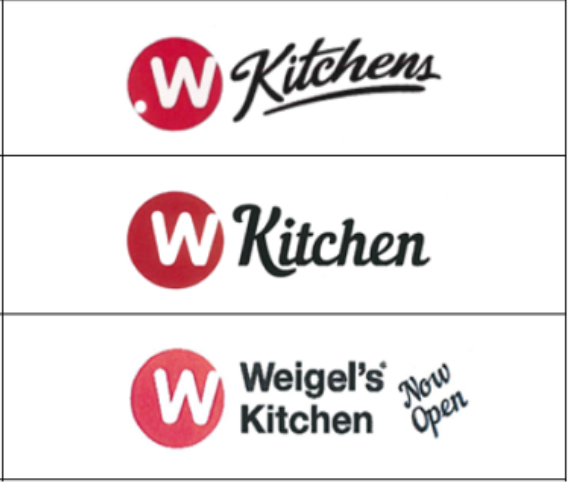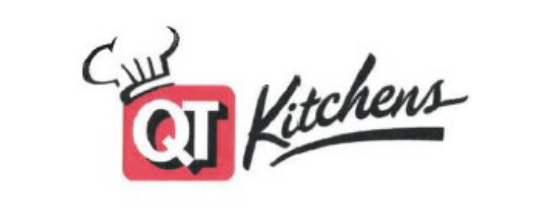“The CAFC said it is not improper for the TTAB to ‘determine that, for rational reasons, it should give more or less weight . . . to a particular feature of the mark provided that its ultimate conclusion regarding the likelihood of confusion rests on [a] consideration of the marks in their entireties.’”
On January 8, the United States Court of Appeals for the Federal Circuit (CAFC) affirmed a decision of the United States Patent and Trademark Office, Trademark Trial and Appeal Board (TTAB) dismissing QuikTrip West, Inc.’s (QuikTrip) opposition to Weigel Stores, Inc.’s (Weigel) registration of the mark W WEIGEL’S KITCHEN NOW OPEN on the ground that there was not likelihood of confusion with QuikTrip’s registered design mark, QT KITCHENS (QuikTrip West, Inc. v. Weigel Stores, Inc.).
TTAB Finds the Marks Dissimilar
 QuikTrip operates a gasoline and convenience store and has sold food and beverages in its stores under the registered mark QT KITCHENS since 2011. In 2014, Weigel, which also operates gasoline and convenience stores, began using a stylized mark, QT KITCHENS, in connection with food and beverages sold in its stores. In response to a cease-and-desist letter sent by QuikTrip, Weigel modified its mark by changing “KITCHENS” to “KITCHEN,” altering the font, and adding the words “WEIGEL’S” and “NOW OPEN.” In 2017, Weigel applied to register the mark W WEIGEL’S KITCHEN NOW OPEN and QuikTrip filed an opposition, “asserting that it would create a likelihood of confusion with its QT KITCHENS mark.”
QuikTrip operates a gasoline and convenience store and has sold food and beverages in its stores under the registered mark QT KITCHENS since 2011. In 2014, Weigel, which also operates gasoline and convenience stores, began using a stylized mark, QT KITCHENS, in connection with food and beverages sold in its stores. In response to a cease-and-desist letter sent by QuikTrip, Weigel modified its mark by changing “KITCHENS” to “KITCHEN,” altering the font, and adding the words “WEIGEL’S” and “NOW OPEN.” In 2017, Weigel applied to register the mark W WEIGEL’S KITCHEN NOW OPEN and QuikTrip filed an opposition, “asserting that it would create a likelihood of confusion with its QT KITCHENS mark.”
 The TTAB evaluated the likelihood of confusion between the two marks in accordance with the DuPont factors. The Board found that “the parties’ identical-in-part goods and related services, overlapping trade channels, overlapping classes of customers, and similar conditions of purchase pointed to a likelihood of confusion finding.” However, the panel also found that “the dissimilarity of the marks weighed against a likelihood of confusion,” the word “KITCHEN(S)” was “at least highly suggestive, if not descriptive,” and Weigel did not act in bad faith. Thus, the Board concluded that despite several factors weighing in favor of a likelihood of confusion, the marks were so dissimilar that there would not be a likelihood of confusion.
The TTAB evaluated the likelihood of confusion between the two marks in accordance with the DuPont factors. The Board found that “the parties’ identical-in-part goods and related services, overlapping trade channels, overlapping classes of customers, and similar conditions of purchase pointed to a likelihood of confusion finding.” However, the panel also found that “the dissimilarity of the marks weighed against a likelihood of confusion,” the word “KITCHEN(S)” was “at least highly suggestive, if not descriptive,” and Weigel did not act in bad faith. Thus, the Board concluded that despite several factors weighing in favor of a likelihood of confusion, the marks were so dissimilar that there would not be a likelihood of confusion.
Similarity of the Marks
On appeal, QuikTrip challenged the Board’s analysis regarding the similarity of the marks, Weigel’s alleged bad faith, and the Board’s overall weighing of the Dupont factors. With respect to similarity, QuikTrip argued that the “Board improperly dissected the marks when analyzing their similarity.” The CAFC agreed with Weigel that the Board’s analysis was correct and noted that it is not improper for the Board to “determine that, ‘for rational reasons,’ it should give ‘more or less weight . . . to a particular feature of the mark’ provided that its ultimate conclusion regarding the likelihood of confusion ‘rests on [a] consideration of the marks in their entireties’” (citing Packard Press, Inc. v. Hewlett Packard Co.). The CAFC reasoned that the Board correctly accorded less weight to the term KITCHEN(S) because it was a “highly suggestive, if not descriptive word” and was entitled to afford more weight to the “dominant, distinct portions of the mark,” such as “Weigel’s encircled W next to the surname Weigel’s and QuikTrip’s QT in a square below a chef’s hat—given their prominent placement, unique design, and color.” Thus, the CAFC concluded that the Board properly compared the marks in their entireties, despite weighing certain portions more heavily, and the Board’s findings were supported by substantial evidence.
Bad Faith
In considering QuikTrip’s argument that Weigel acted in bad faith, the CAFC cited Sweats Fashions, Inc. v. Pannill Knitting Co., explaining that an “inference of ‘bad faith’ requires something more than mere knowledge of a prior similar mark”; rather, it requires an intent to confuse. The CAFC disagreed with QuikTrip that the Board failed to “meaningfully weigh evidence that Weigel intentionally copied elements of QuikTrip’s mark in order to confuse customers” and did not explicitly discuss its arguments relating to trade dress related bad faith. The CAFC explained that Weigel’s “willingness to alter its mark several times in order to prevent customer confusion negate[d] any inference of bad faith.” The CAFC also noted that the Board did not err in not addressing QuikTrip’s trade dress arguments, since the Board was “not obliged to discuss every piece of evidence that QuikTrip raised.” Thus, the CAFC concluded that substantial evidence supported the Board’s finding that Weigel did not act in bad faith.
Weighing of the DuPont Factors
The CAFC considered QuikTrip’s argument that “the Board legally erred in giving decisive weight to the dissimilarity of the marks under DuPont factor one, while disregarding other DuPont factors strongly supporting a likelihood of confusion.” The CAFC disagreed with QuikTrip, noting that analyzing the DuPont Factors is a “balancing test” and “[o]ne DuPont factor ‘may be dispositive in a likelihood of confusion analysis, especially when that single factor is the dissimilarity of the marks’” (Citing Champagne Louis Roederer, S.A. v. Delicato Vineyards). The CAFC explained that the Board did not disregard any evidence, it simply determined that such evidence was outweighed by the differences in the marks. Thus, the CAFC affirmed the decision of the TTAB, dismissing QuikTrip’s opposition.

![[IPWatchdog Logo]](https://ipwatchdog.com/wp-content/themes/IPWatchdog%20-%202023/assets/images/temp/logo-small@2x.png)

![[Advertisement]](https://ipwatchdog.com/wp-content/uploads/2024/04/UnitedLex-May-2-2024-sidebar-700x500-1.jpg)
![[Advertisement]](https://ipwatchdog.com/wp-content/uploads/2024/04/Artificial-Intelligence-2024-REPLAY-sidebar-700x500-corrected.jpg)
![[Advertisement]](https://ipwatchdog.com/wp-content/uploads/2024/04/Patent-Litigation-Masters-2024-sidebar-700x500-1.jpg)

![[Advertisement]](https://ipwatchdog.com/wp-content/uploads/2021/12/WEBINAR-336-x-280-px.png)
![[Advertisement]](https://ipwatchdog.com/wp-content/uploads/2021/12/2021-Patent-Practice-on-Demand-recorded-Feb-2021-336-x-280.jpg)
![[Advertisement]](https://ipwatchdog.com/wp-content/uploads/2021/12/Ad-4-The-Invent-Patent-System™.png)






Join the Discussion
No comments yet.